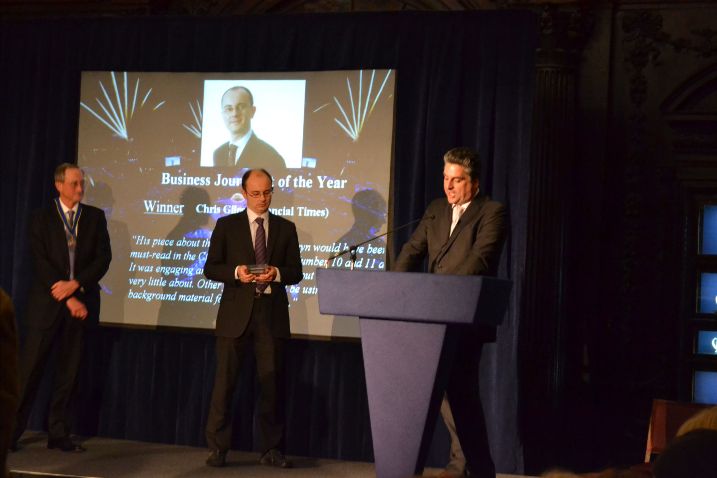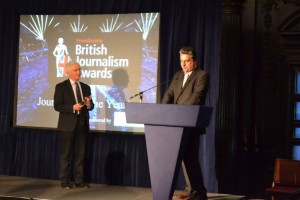British Journalism Awards at Stationers’ Hall

Given the recent cataclysmic changes in journalism due to the outcome of the Leveson enquiry, the atmosphere at the British Journalism Awards was often strangely uncomfortable. Journalists spoke in hushed whispers about the uncertainty of the British press, discussing their own futures, while reflecting upon the seismic upheaval within their own industry.
 Enter Lord Black of Brentwood, also the executive director of the Telegraph Media Group. It was obvious that everybody was listening attentively, as he said: “You are the custodians of a free press. We should never cease to remember that the British press is the best in the world”. These words set the tone for the rest of the night as the British Journalism Awards went about promoting “the best of British journalism”, reflecting the importance of the integrity of the British press, despite its now uncertain future.
Enter Lord Black of Brentwood, also the executive director of the Telegraph Media Group. It was obvious that everybody was listening attentively, as he said: “You are the custodians of a free press. We should never cease to remember that the British press is the best in the world”. These words set the tone for the rest of the night as the British Journalism Awards went about promoting “the best of British journalism”, reflecting the importance of the integrity of the British press, despite its now uncertain future.
The awards ceremony kicked off with the nominations for the Investigation of the Year. The winners were The Times’ Alexi Mostrous and Fay Schlesinger for their investigation into the use of human guinea pigs for medical research in India, a story which uncovered how Indian drug companies use illiterate patients to be used for research without their consent. The Journalism Innovation of the Year award went to The Guardian for Reading the Riots, a project that made use of different multimedia platforms to investigate various key factors behind the London Riots.
 The Journalist of the Year award went to David Walsh, who also scooped the prize for Best Sports Journalist. His story exposed cyclist Lance Armstrong as a drugs cheat, a story which Walsh had pursued since 1999. Met with raucous applause as he accepted his award, Walsh spoke with humility, stating that this “will define his life as a journalist”.
The Journalist of the Year award went to David Walsh, who also scooped the prize for Best Sports Journalist. His story exposed cyclist Lance Armstrong as a drugs cheat, a story which Walsh had pursued since 1999. Met with raucous applause as he accepted his award, Walsh spoke with humility, stating that this “will define his life as a journalist”.
The awards concluded not with any further mentioning of the Leveson enquiry but with a fitting tribute to American journalist Marie Colvin, who, after two decades of reporting for The Sunday Times, was tragically killed in Syria in February this year. Having been regarded as one of the finest journalists of our time, the tribute to Colvin was very appropriate, as it served as a powerful reminder of what great journalism is capable of.
In turbulent times when the very infrastructure of journalism is threatened, the British Journalism Awards is a timely ceremony and is needed to show what journalism can achieve for our society.
Conor Nyhan
Photos: Conor Nyhan

























Facebook
Twitter
Instagram
YouTube
RSS